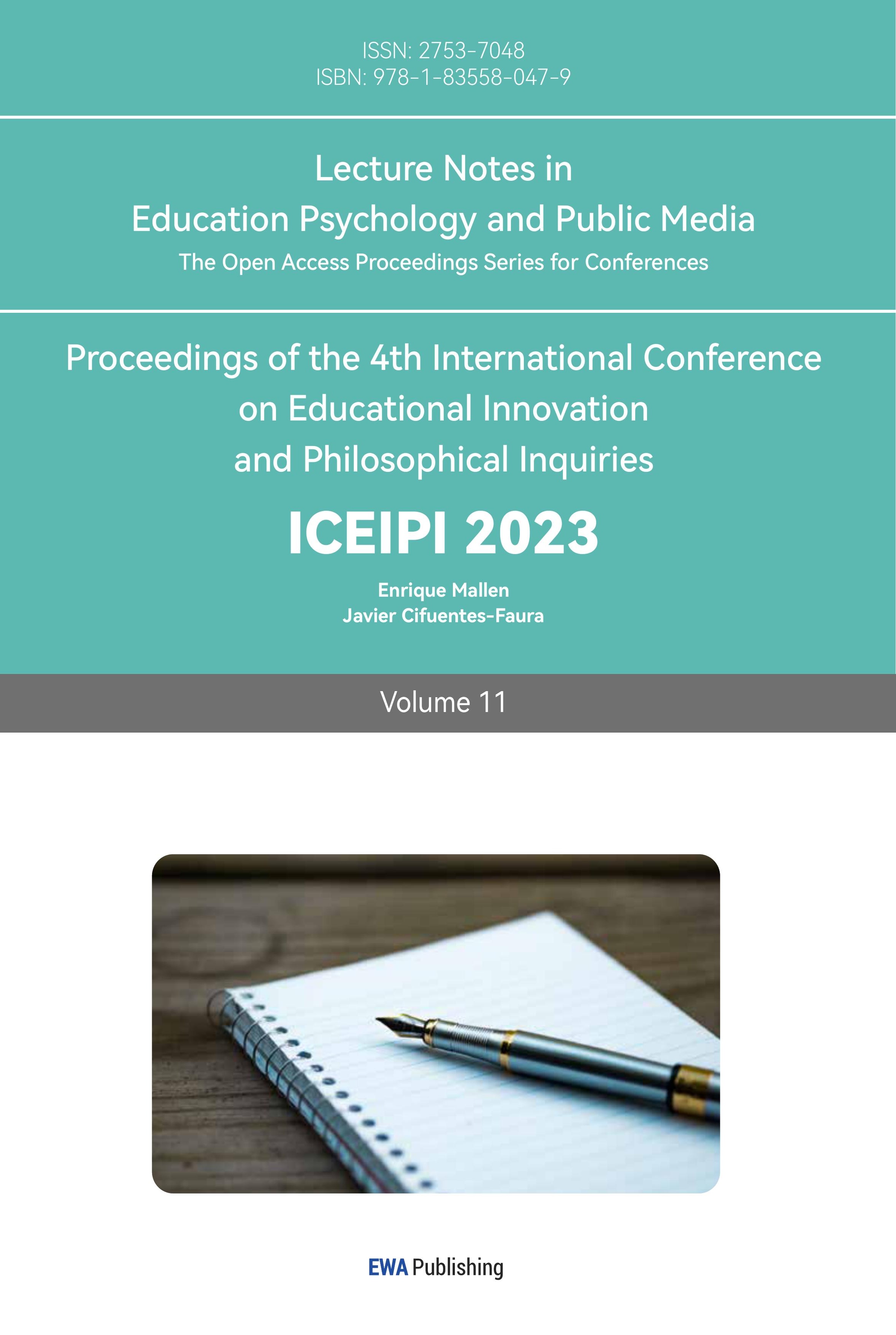References
[1]. Wang Xuhui. 2017. “Research on supply and demand of higher education in China.” Doctor Dissertation, Xiamen University.
[2]. Sun Yujing. 2019. An analysis of the employment dilemma of second-batch college students — based on Bourdieu’s “cultural capital” theory[J]. Modern Communication, (06):58-59.
[3]. Zhao Hongbing. 2017. Exploring the employment strategy of engineering college students in the new media environment[J]. Talent Resource Development, (22):94-95. DOI:10.19424/j.cnki.41-1372/d.2017.22.047.
[4]. Li Yingxue. 2021. Analysis of the employment difficulties of college students from microeconomics[J]. Modern Marketing (Academy Edition), (11):181-183.
[5]. Wang Xuefei, Chen Wei, Jiang Wei. 2020. Research on the enhancement of core competitiveness of employment of engineering college students by humanities literacy education[J]. Jiangsu Higher Education, (07):107-111. DOI:10.13236/j.cnki.jshe.2020.07.017.
[6]. Sun Ning. 2022. Research on the psychological problems and countermeasures of college students’ employment[J]. Modern Trade Industry, 43(07):78-80. DOI:10.19311/j.cnki.1672-3198.2022.07.035.
[7]. Du Wei, Han Xiangzong. 2022. Analysis of the current employment problem of college students and discussion of countermeasures[J]. Journal of Economic Research, (08):74-77.
[8]. Feng Kun, Zhu Weiguang. 2022. Exploring the strategy of college students’ employment guidance service under the background of “Internet+” era[J]. Heilongjiang human resources and social security, (08):128-130.
[9]. Yang Wei. 2022. Research on the development strategy of college students’ employment guidance in the background of big data[J]. Innovation and Entrepreneurship Theory Research and Practice, 5(08):63-65.
[10]. Chen Gang, Weng Wenxiang, and Sun Daoming, 2001. 'Survey on the Employment competitiveness of Female Engineering Students and their Countermeasures—Based on the survey data analysis of A University'[J], Journal of Tongling University, (2021), 72- 75.
Cite this article
Huang,S. (2023). Employment Analysis of Second Batch Engineering Students. Lecture Notes in Education Psychology and Public Media,11,152-157.
Data availability
The datasets used and/or analyzed during the current study will be available from the authors upon reasonable request.
Disclaimer/Publisher's Note
The statements, opinions and data contained in all publications are solely those of the individual author(s) and contributor(s) and not of EWA Publishing and/or the editor(s). EWA Publishing and/or the editor(s) disclaim responsibility for any injury to people or property resulting from any ideas, methods, instructions or products referred to in the content.
About volume
Volume title: Proceedings of the 4th International Conference on Educational Innovation and Philosophical Inquiries
© 2024 by the author(s). Licensee EWA Publishing, Oxford, UK. This article is an open access article distributed under the terms and
conditions of the Creative Commons Attribution (CC BY) license. Authors who
publish this series agree to the following terms:
1. Authors retain copyright and grant the series right of first publication with the work simultaneously licensed under a Creative Commons
Attribution License that allows others to share the work with an acknowledgment of the work's authorship and initial publication in this
series.
2. Authors are able to enter into separate, additional contractual arrangements for the non-exclusive distribution of the series's published
version of the work (e.g., post it to an institutional repository or publish it in a book), with an acknowledgment of its initial
publication in this series.
3. Authors are permitted and encouraged to post their work online (e.g., in institutional repositories or on their website) prior to and
during the submission process, as it can lead to productive exchanges, as well as earlier and greater citation of published work (See
Open access policy for details).
References
[1]. Wang Xuhui. 2017. “Research on supply and demand of higher education in China.” Doctor Dissertation, Xiamen University.
[2]. Sun Yujing. 2019. An analysis of the employment dilemma of second-batch college students — based on Bourdieu’s “cultural capital” theory[J]. Modern Communication, (06):58-59.
[3]. Zhao Hongbing. 2017. Exploring the employment strategy of engineering college students in the new media environment[J]. Talent Resource Development, (22):94-95. DOI:10.19424/j.cnki.41-1372/d.2017.22.047.
[4]. Li Yingxue. 2021. Analysis of the employment difficulties of college students from microeconomics[J]. Modern Marketing (Academy Edition), (11):181-183.
[5]. Wang Xuefei, Chen Wei, Jiang Wei. 2020. Research on the enhancement of core competitiveness of employment of engineering college students by humanities literacy education[J]. Jiangsu Higher Education, (07):107-111. DOI:10.13236/j.cnki.jshe.2020.07.017.
[6]. Sun Ning. 2022. Research on the psychological problems and countermeasures of college students’ employment[J]. Modern Trade Industry, 43(07):78-80. DOI:10.19311/j.cnki.1672-3198.2022.07.035.
[7]. Du Wei, Han Xiangzong. 2022. Analysis of the current employment problem of college students and discussion of countermeasures[J]. Journal of Economic Research, (08):74-77.
[8]. Feng Kun, Zhu Weiguang. 2022. Exploring the strategy of college students’ employment guidance service under the background of “Internet+” era[J]. Heilongjiang human resources and social security, (08):128-130.
[9]. Yang Wei. 2022. Research on the development strategy of college students’ employment guidance in the background of big data[J]. Innovation and Entrepreneurship Theory Research and Practice, 5(08):63-65.
[10]. Chen Gang, Weng Wenxiang, and Sun Daoming, 2001. 'Survey on the Employment competitiveness of Female Engineering Students and their Countermeasures—Based on the survey data analysis of A University'[J], Journal of Tongling University, (2021), 72- 75.









